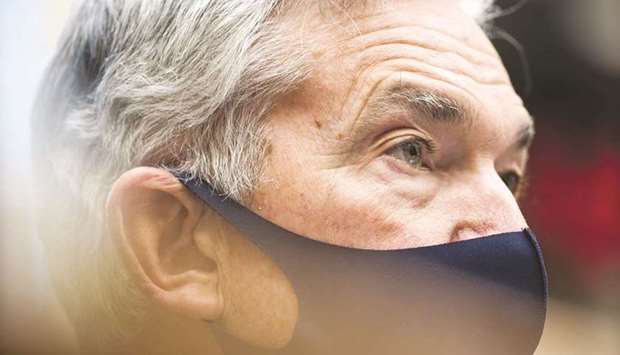Federal Reserve chair Jerome Powell said the US central bank would wait until the economy has “all but fully recovered” to pull back the extraordinary monetary support it rolled out in response to the coronavirus pandemic.
“As we make substantial further progress towards our goals, we’ll gradually roll back the amount of Treasury and mortgage-backed securities we’re buying. And then in the longer run, we’ve set out a test that will enable us to raise interest rates,” Powell said in an interview on National Public Radio’s Morning Edition show on Thursday.
“So, we will – very, very gradually, over time, and with great transparency, when the economy has all but fully recovered – we will be pulling back the support that we provided during emergency times,” Powell said. Data released later on Thursday showed applications for US unemployment benefits fell to the lowest in a year in the week ended March 20, signalling improvement for the labour market as vaccinations accelerate and business restrictions ease in many states.
The Fed chief and his colleagues on the central bank’s policy-setting Federal Open Market Committee held interest rates near zero at the conclusion of their policy meeting last week and reiterated guidance that they would maintain their massive bond-buying campaign at a $120bn monthly pace until “substantial further progress” had been achieved on their goals for employment and inflation.
Longer-term interest rates have been on the rise since Democrats won control of the Senate in January as investors have speculated that the Fed’s timeline for withdrawal of stimulus may be pulled forward, thanks in large part to the $1.9tn relief package recently signed into law. Powell, in his fourth time speaking publicly this week, said during the NPR interview that upgraded economic projections published following last week’s meeting reflected an acceleration in vaccinations against Covid-19 and the historic fiscal support from Washington.
The projections showed Fed officials expect economic growth of 6.5% in 2021, which would mark the fastest annual pace of expansion since 1983. They also revealed that seven of 18 FOMC participants expected it would be appropriate to begin raising rates by the end of 2023 – up from five in December, when the last round of projections was published.
“We’ve seen something like 85mn Americans have now had at least one shot. Daily shots are running at 2.5mn. And that’s going to enable us to reopen the economy sooner than might have been expected,” Powell said.
“The amount of fiscal support the economy has received is historically large, and that’s going to result in higher economic activity and hiring,” he said. “I’d want Congress to get the bulk of the credit here.”
The FOMC’s latest policy statement says it won’t begin raising rates “until labour market conditions have reached levels consistent with the committee’s assessments of maximum employment and inflation has risen to 2% and is on track to moderately exceed 2% for some time.”
Powell nodded to that guidance on Thursday during the NPR interview when asked whether all of the money the Fed and Congress have pumped into the economy to counter the effects of the pandemic would result in higher inflation.
“We are strongly committed to inflation that averages 2% over time,” he said. “If it were to be higher or lower than that, then we’d use our tools to move inflation back to 2%.”

Jerome Powell
